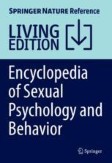Search
Search Results
-
Diagnostic Differential Between Pedophilic-OCD and Pedophilic Disorder: An Illustration with Two Vignettes
Despite the prevalence of atypical sexual thoughts in OCD presentations, research suggests that treatment providers often misclassify OCD with...
-
Validating the Screening Scale of Pedophilic Crime Scene Behavior
The Screening Scale of Pedophilic Crime Scene Behavior (SSPC) is a seven-item structured rating scale assessing pedophilic sexual arousal. In the...
-
Neuropsychological Functioning in Sexual Offenders With and Without Pedophilic Disorder
This study sought to examine neuropsychological functioning in men with pedophilic disorder (PD), in order to assess whether findings from prior...
-
The Need for a Prevention Program for Child Sexual Abuse in Brazil: A Report of Shortfall Care to Pedophilia and its Critical Consequences
From a case report of a person with pedophilic disorder, this paper focuses on the issue of pedophilia, child sexual abuse, and the need for specific...
-

-
Humanizing Pedophilia as Stigma Reduction: A Large-Scale Intervention Study
The stigmatization of people with pedophilic sexual interests is a topic of growing academic and professional consideration, owing to its potential...

-
Aberrant brain activity in pedophilia links to receptor distribution, gene expression, and behavior
Despite an estimated lifetime prevalence of 0.5–1.0% in men and high public concern, no effective treatment is known for pedophilic disorder. Here,...

-
Early Maladaptive Schemas in Sex Offenders and Non-Sexual Violent Offenders: A Systematic Review
Sex offenders and non-sexual violent offenders display distinct cognitive distortions that shape their offenses. Some evidence suggests that early...

-
Childhood Adversity and Offense-Supportive Cognitions Among Czech Adults with a Sexual Interest in Violence or Children
Individuals with paraphilic interests in sexual violence or children may be more likely to sexually offend if they possess offense-supportive...
-
The Viewing Reaction Time as a Diagnostic Tool of Pedohebephilia in the Dunkelfeld
Diagnosing pedohebephilia is fraught with obstacles given the tabooed nature of this sexual preference. The viewing reaction time effect (VRT)...

-
The Relation Between the Paraphilias and Anxiety in Men: A Case–Control Study
Despite a multitude of theoretical views, it is still unclear how individuals develop and sustain paraphilic interests (e.g., sexual attraction to...

-
Neurodevelopmental Differences, Pedohebephilia, and Sexual Offending: Findings from Two Online Surveys
The neurodevelopmental theory of pedohebephilia states that sexual interests in children arise from early neurodevelopmental perturbations, as, for...
-
Excitation Transfer Between Sexual Arousal and Other Emotions in a Community Sample
Excitation transfer, the transfer of arousal from one emotion to another, might be a mechanism in the development of unusual sexual interests. In...

-
Taxometric Analysis of the Latent Structure of Pedophilic Interest
The present study examined the latent structure of pedophilic interest. Using data from phallometric tests for pedophilic interest across four...

-
Pedophile, Child Lover, or Minor-Attracted Person? Attitudes Toward Labels Among People Who are Sexually Attracted to Children
The primary label for people who are sexually attracted to children (“pedophile”) is conflated with sexual offending behavior and tainted with...

-
Elaborating and Testing Erotic Target Identity Inversion Theory in Three Paraphilic Samples
Some men sexually attracted to types of persons (e.g., women) or things (e.g., animals) also have internalized sexual attractions : sexual arousal by...

-

-

-
Offence-Supportive Cognitions, Atypical Sexuality, Problematic Self-Regulation, and Perceived Anonymity Among Online and Contact Sexual Offenders Against Children
Cognitions that support sexual offending, atypical sexuality, and problems with self-regulation are important indicators of offending among men who...

